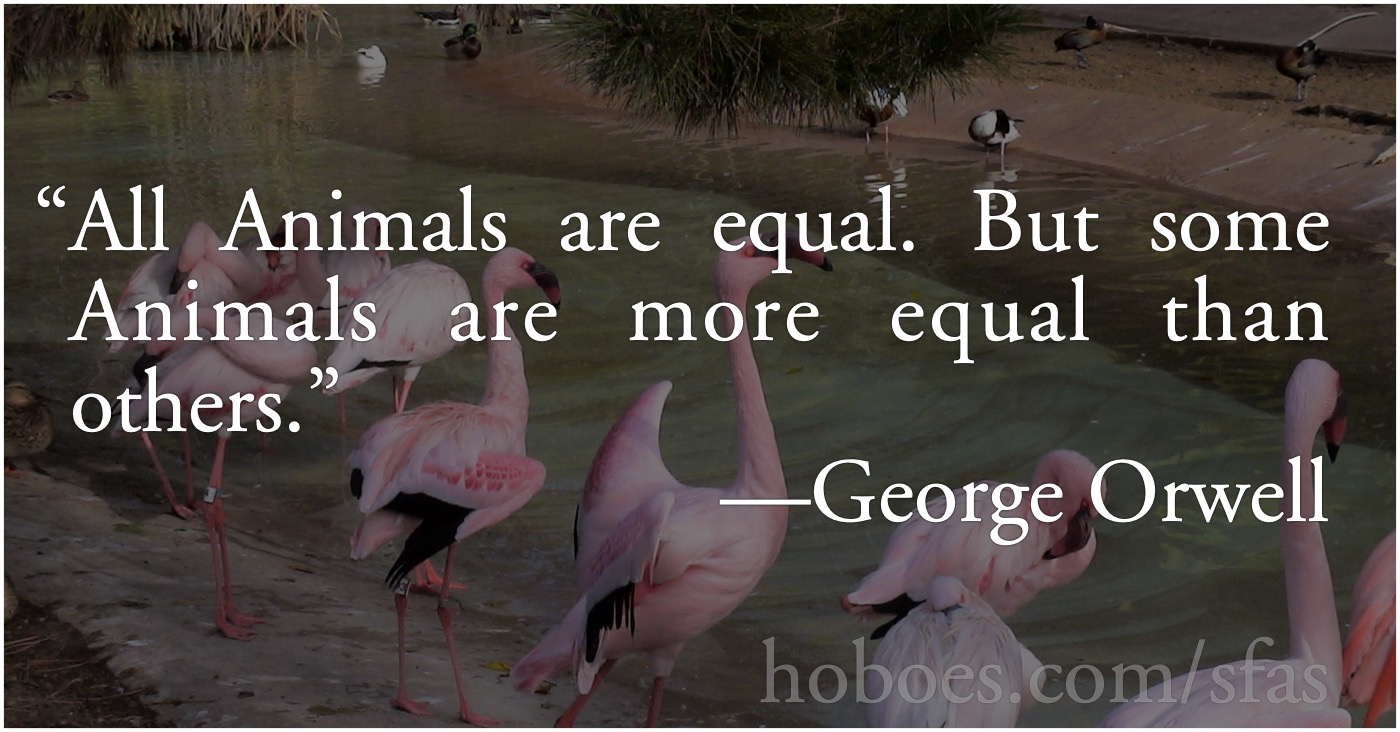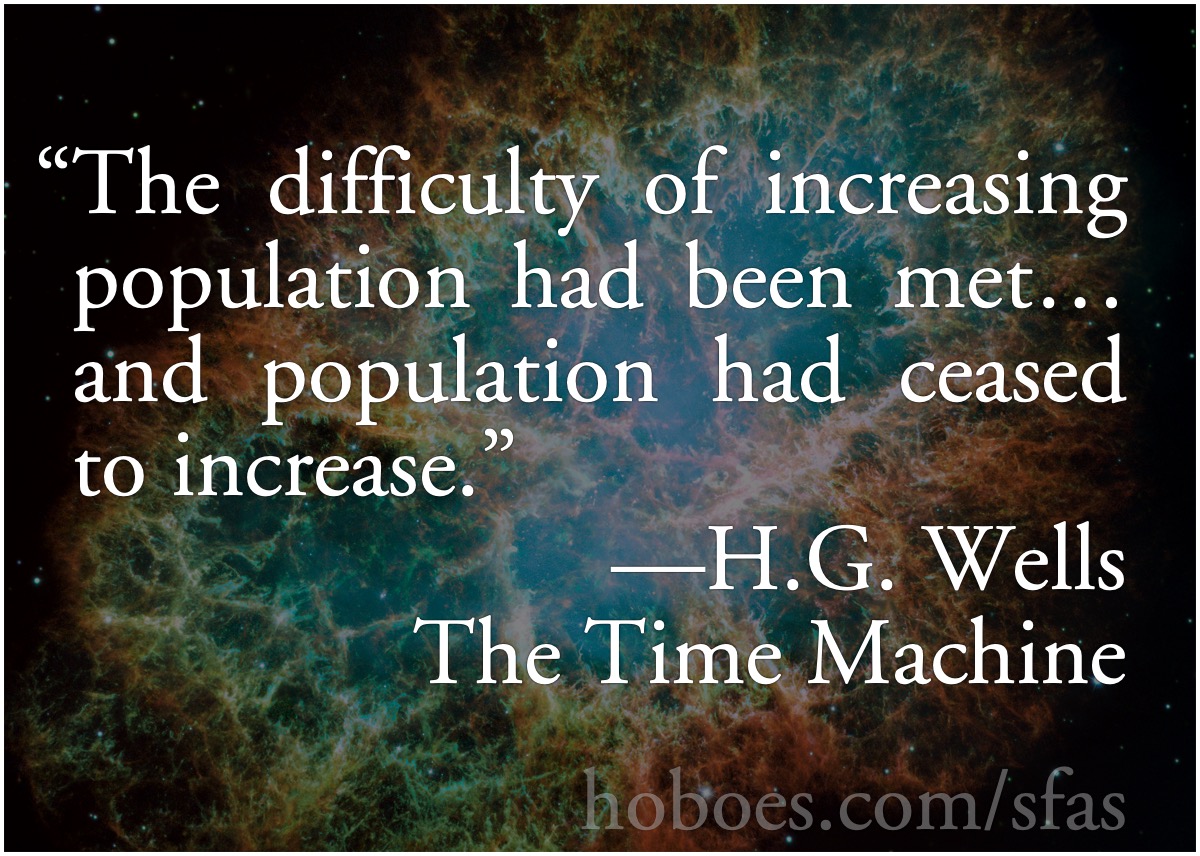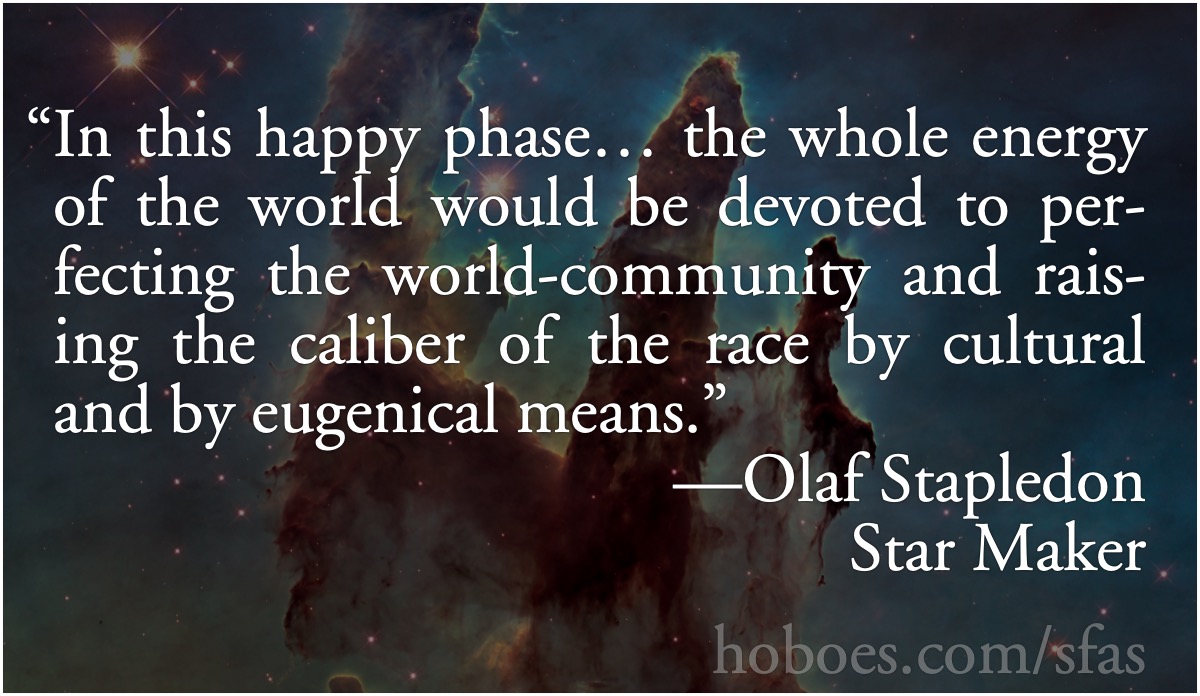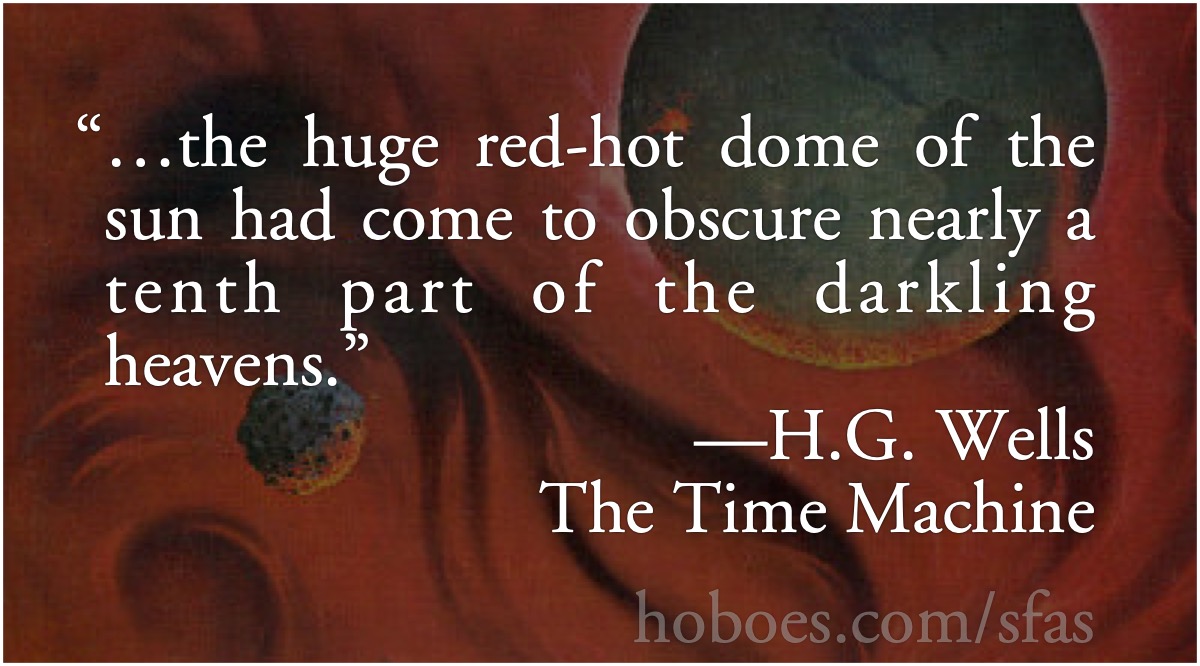Science fiction’s anti-socialist socialists
From The Time Machine to 1984• and Animal Farm to Harrison Bergeron, why are socialist societies written by actual socialists so dystopian? Why are leftist writers’ greatest successes seemingly so conservative?
In Animal Farm Orwell clearly saw that the transition from socialism to violent dictatorship was a natural one. The animals put up with tyranny until it was too late because of the socialist promises of the pigs. In 1984• Big Brother could only rewrite history because the state controlled all industry, including media. Orwell recognized the socialist state’s requirement that people believe the state’s lies, embodied best in C.S. Lewis’s suggestion in God in the Dock that tyrannies that must justify themselves are worse than tyrannies that don’t care.
Of all tyrannies, a tyranny sincerely exercised for the good of its victims may be the most oppressive. It may be better to live under robber barons than under omnipotent moral busybodies. The robber baron’s cruelty may sometimes sleep, his cupidity may at some point be satiated; but those who torment us for our own good will torment us without end for they do so with the approval of their own conscience. — C. S. Lewis (The Humanitarian Theory of Punishment•)
A mere tyrant wouldn’t care what Winston believed. Only a socialist tyrant requires not just that people be stomped on, but that they agree with the stomping. That was a fundamental part of 1984.
Like Orwell, H.G. Wells was an avowed socialist. He wanted his socialism managed by a scientific elite; his 1939 The New World Order is a good example of Chesterton’s observation in Heretics that utopian reformers often assume that they’ve “overcome… the greatest difficulty of man” and then go on to “give an elaborate account of the overcoming of the smaller ones… by motor-car or balloon”.1.
Chesterton may well have been aiming that quote directly at his friend Wells. In The New World Order, Wells suggested organizing the voting public into voting for candidates “who have done things and can do things” because “it would be quite easy now to excite a number of anxious people with a cry for ‘Competence not Party’”. After dealing perfunctorily with this complete revolution in how people think and act, he went into great detail about what the candidates should do once in power: take over the educational system, collectivization to the point that “buying and selling to secure income and profit will be not simply needless but impossible”.
Wells assumed that overcoming human nature was easy, when it’s the hardest part. He really did, as Chesterton noted, just gloss over the part about convincing voters to vote for better candidates, candidates who could be trusted to be good governors, and then spent the bulk of his essay on the ingenious ways those “good governors” would transform the world once they took power.
But Wells was not a stupid man. He recognized the dangers of an elite managing the labor of everyone else for the greater good: if you’re not paying for it, you are the product. That is, after all, what The Time Machine is about. It’s both about the results of a rule by the anointed, and a very successful counterrevolution of the proletariat.
In the time traveler’s socialist paradise, “There were no hedges, no signs of proprietary rights, no evidences of agriculture; the whole earth had become a garden.”
The shop, the advertisement, traffic, all that commerce which constitutes the body of our world, was gone. It was natural on that golden evening that I should jump at the idea of a social paradise. The difficulty of increasing population had been met, I guessed, and population had ceased to increase.
This paradise addressed the made-up problems that socialists have used as excuses for power grabs for over a century, and still do today. The primacy of the family over the state had been solved, and, most notably, overpopulation was conquered. But this was not because of a successful planned world economy. Population had not just “ceased to increase”. It had fallen drastically due to the complete failure of the social paradise put in place to provide a free life for everyone—partly because someone has to provide that free life. If you’re familiar with the book, you know the method by which population was kept in check. If you’re not, go and read it now. There are spoilers ahead.
The time traveler is disappointed both with the social paradise and with the species of humanity populating that paradise. They are “indolent” and “easily fatigued”. Civilization has fallen into “languor and decay”.
For a moment I felt that I had built the Time Machine in vain.
The purpose of building the time machine wasn’t to travel through time. At that he was very successful. His purpose was to see first-hand the glorious social future that he was working to create.
More prosaically, the time traveler is also disappointed at the lack of technology. There are no longer too many forms of deodorant on the grocery shelves. Nor any form of medicine or even matches. It’s yet another socialist problem solved, though not one that Wells would necessarily have approved of. But he did understand that socialist futures are necessarily technologically regressive.
It’s hard not to see, in Wells’s thirty-million-year end-of-the-world, an allegory for a world under socialism:
At last, more than thirty million years hence, the huge red-hot dome of the sun had come to obscure nearly a tenth part of the darkling heavens.
Which leads me to Olof Stapledon’s Star Maker. It may well be the key to understanding socialist dystopias. In many cases, they don’t see it as a dystopia.
Star Maker is a utopian novel. But it’s a strange utopia to modern eyes. Unlike the The Time Machine, 1984, and Animal Farm, the worlds of Star-Maker aren’t meant to be dystopian. Yet they contain all the features that make the former works so horrific—even down to killing those who have outlived their usefulness to the socialist anointed.
The worlds that survive best do so with socialist dictatorships, eugenics, euthanasia, and an all-powerful one-way media. Judging from some of the entries in the glossary, it may have been an attempt by Stapledon to create a communist2 religion, or at least myth, comparable to Tolkien’s similar attempt to create a mythology for the English.
Star Maker is very approving of socialist dictatorships, and not just Stapledon’s own fictional ones. There’s a satirical-in-retrospect digression as Stapledon’s protagonist leaves the confines of Earth. While looking over the earth from high in the atmosphere, he twice mentions some great work of Lenin’s called Magnetostroy.
There Lenin lay, victorious. Far off, at the foot of the Urals, imagination detected the ruddy plumes and smoke-pall of Magnetostroy.
…
Ancient Memphis itself now echoed with the rumour of Magnetostroy.
He writes about Magnetostroy as if it were some great wonder of the world, but it’s certainly not one I’d ever heard of. I passed over the first entry thinking it must be some city renamed by the communists and since returned to its pre-communist name. On reading the word a second time, I decided it was important enough verify my guess, so I googled it. What comes up is Ozymandian in its obscurity. Three of the results are from Star Maker. Three more are a reddit and Wikipedia commenter who has taken it for their anonymous nickname. Two are things called magnetos in Troy, Kansas and Troy, Illinois.
The one that is likely what Stapledon refers to I found in the caption to a photo in the 1931 Victory of the 5 Year Plan—A blow to Capitalism. It was apparently some construction, perhaps a factory, that is all but forgotten. The great monument to socialist dictatorship is less than a footnote today.
Man in Star Maker is perfectible—by the right people. That perfection involves a literal community of minds, a true expanded consciousness. The worlds that survive to greater consciousness all exhibit “a remarkable identity”:
For instance, in the loosest possible sense, all were communistic; for in all of them the means of production were communally owned, and no individual could control the labour of others for private profit. Again, in a sense all these world-orders were democratic, since the final sanction of policy was world-opinion. But in many cases there was no democratic machinery, no legal channel for the expression of world-opinion. Instead, a highly specialized bureaucracy, or even a world-dictator, might carry out the business of organizing the world’s activity with legally absolute power, but under constant supervision by popular will expressed through the radio.
His utopia is a dictatorship controlled by the media. But that’s not the worst of it. Barring an astronomical disaster, the purpose of this enlightened dictatorship was to improve humanity:
In this happy phase, then, which might last for a few centuries or for many thousands of years, the whole energy of the world would be devoted to perfecting the world-community and raising the caliber of the race by cultural and by eugenical means.
Sometimes this eugenics leads to developing individuals who, when they detect themselves disagreeing too much with a newer generation, will “thereupon crave and practice euthanasia, gladly yielding his place to a successor of more modern type.”
Stapledon published Star Maker in 1937. Giving him the benefit of the doubt, he should have known better. More likely, he probably knew exactly how these “enlightened” dictatorships were being used elsewhere in the world.
The closer he gets to utopia, the more horrific it looks now that we have World War II behind us. The closer he gets to utopia, the more he displays the things that expose socialism for what it is, at root. He gives us a glimpse of not just an outdated worldview, but one that led to massive death and destruction, and always will.
There are some elements of the humor of the anointed in Star Maker. For example, the first race he encounters uses taste much more extensively than we do, and different peoples are divided by taste rather than colors. Each group, of course, assumes themselves to be in the best taste. The industrial class has evolved to have near-uniformly low taste, according to those of good taste. Satirical, I think, but it also echoes Wells’s distaste for the lower classes.
It is always difficult to ascribe to a novelist the views of their characters, even when the character seems to otherwise mirror the author as closely as the time traveler does Wells. Further, a lot of people discount racist views from historical figures, because they assume that the past is itself racist. But it’s all about context; certainly, Abraham Lincoln held, or at least spoke, views we would consider racist. But Lincoln rose above his time to overcome his prejudices and declare that the phrase “all men are created equal” means exactly what it says. The Lincoln who said that the slave “is my equal and the equal of Judge Douglas, and the equal of every living man”3 is not racist. And he was elected president in the United States.
H.G. Wells’s views on race at the time he wrote The Time Machine, thirty years after Lincoln died, are not just extreme but were extreme for his time. His worldview pretty much encapsulates the vision of the anointed. He published The Time Machine in 1895; in 1901, he published his nonfiction Anticipations of the Reaction of Mechanical and Scientific Progress Upon Human Life and Thought.
The world has a greater purpose than happiness; our lives are to serve God’s purpose, and that purpose aims not at man as an end, but works through him to greater issues.
And how is that purpose served? Wells’s path follows the opposite of Lincoln’s. Wells starts from the view that we must treat everyone as individuals, not as races, that our lives are to serve God’s purpose—and then concludes that “those swarms of black, and brown, and dirty-white, and yellow people… will have to go.”
Wells can go from God’s purpose to racism because, unlike Lincoln with his conservative principles, Wells is more like Douglas. He chooses to decide what God means. Wells doesn’t really believe in God when he writes about God’s purpose. He believes in himself as someone who knows what the future should hold. He denies heaven and hell (“any post mortem state of rewards and punishments”) and in fact any future for the individual soul (he disparages it as “the immortality of our egotisms”); for him the only concern is “the future of our race”.
Wells’s social commentary is marred by the time traveler’s views on human evolution, precisely because his main character is a thinly-disguised voice for Wells himself; Wells also subscribed to a progressive Darwinism of the type the time traveler holds. Speaking of his future friend Weena, the time traveler says, “She always seemed to me, I fancy, more human than she was, perhaps because her affection was so human.”
That far into the future—800,000 years—“little Weena” may not have been human, at least if your definition of human is limited to homo sapiens. But it is likely that Wells also shared the view of other progressives that blacks were not quite human. The time traveler’s observations mirror Wells’s conclusion about “those swarms of… dirty people” when he says:
Then, think how narrow the gap between a negro and a white man of our own times, and how wide the interval between myself and these of the Golden Age!
Wells’s socialism is a “greater issue” than mankind, and if other people must be destroyed to arrive at that greater future, that’s a price the committed socialist is willing to pay.4
Which ultimately leads back to the reasons so many great socialist authors end up providing conservative outlooks: they’re not really conservative. They don’t realize that their utopias are warnings against socialism in general. Obviously, unlike Stapledon, neither Orwell nor Wells wrote their respective masterpieces as instruction manuals. They truly meant them to be warnings. But they’re meant to be a warning against other people’s socialism. True utopia can only come from someone like Orwell or Wells.
It’s what Thomas Sowell talks about in The Vision of the Anointed. You have to be mighty arrogant to think that your vision is the one true vision, and that means that even people who agree with you are dangerously wrong. George Orwell• wasn’t criticizing his socialism when he wrote 1984 and Animal Farm, only socialism by other people. H.G. Wells wasn’t criticizing his socialism, he was writing a wish-fulfillment about how socialism can be saved by a dedicated socialist immersed in the lingo of modern technology. Someone like Wells himself.
This doesn’t detract from these novels. The Time Machine and 1984 were among their best works, respectively, and part of it is that they were so intimately familiar not just with socialism but with the desire to implement socialism. They may have been blind to the dangers of socialism in general, but they saw very clearly the dangers of other people’s socialism. Unlike authors who did not believe in socialism, Wells and Orwell wrote from within the savior mentality. It’s an important and compelling vision that more clear-sighted works lack.
There are clues in The Time Machine that strongly indicate that at the end the time traveler, Wells’s Mary Sue, returns to the future to run things right. My own theory is that at the ending of The Time Machine Wells’s protagonist returns to the world of the Eloi and, as a Superior Socialist among fallen humanity, guides the upper classes to real socialism, and protects them from the lower classes.
If an Orwell or a Wells is in charge, well, then socialism will work. They weren’t writing to warn us against socialism. They were writing to warn us that we need to put the right socialists in charge.
People like them.
And the weakness of all Utopias is this, that they take the greatest difficulty of man and assume it to be overcome, and then give an elaborate account of the overcoming of the smaller ones. They first assume that no man will want more than his share, and then are very ingenious in explaining whether his share will be delivered by motor-car or balloon. — G.K. Chesterton (Heretics•)
↑…there is no reason in the world why the Negro is not entitled to all the natural rights enumerated in the Declaration of Independence—the right to life, liberty, and the pursuit of happiness. I hold that he is as much entitled to these as the white man… in the right to eat the bread, without the leave of anybody else, which his own hand earns, he is my equal and the equal of Judge Douglas, and the equal of every living man. — Abraham Lincoln (First Joint Debate at Ottawa)
↑There is evidence that Wells ameliorated his views later, possibly after talking with the amazing Booker T. Washington, but there’s no doubt that when he wrote The Time Machine his protagonist’s views were at best watered-down versions of Wells’s own views.
↑
Christianity
- Review: God in the Dock: Jerry Stratton at Jerry@Goodreads
- “Many of the essays attempt to make Christian beliefs understandable to modern minds… But Lewis also believes, and tries to explain his belief, that Christian teaching is important for the modern world to function—perhaps even more important now than it ever was.”
- Review: Heretics: Jerry Stratton at Jerry@Goodreads
- “Published in 1905, this is a collection of essays about people, and on a common theme of a fashionable contrarianism that isn’t contrarian. Chesterton accuses the elite of his day of worshipping ideas that cannot work (heresy) and avoiding ideas that do work (orthodoxy). He anticipates both Orwell’s Newspeak and Thomas Sowell’s Vision of the Anointed.”
science fiction
- 1984•: George Orwell (paperback)
- “In a grim city and a terrifying country, where Big Brother is always Watching You and the Thought Police can practically read your mind, Winston is a man in grave danger for the simple reason that his memory still functions.”
- Animal Farm
- Animal Farm is billed as “a provocative novel”, but that just underestimates our ability to be completely blind when faced with uncomfortable ideas.
- Review: Star Maker: Jerry Stratton at Jerry@Goodreads
- “This is a very imaginative but hopelessly socialist utopian novel. Analogies to Marxist industrial class relations is repeated throughout every level of the cosmos. Every world undergoes Labor troubles regardless of how wildly different the world is.”
- Review: The Time Machine: Jerry Stratton at Jerry@Goodreads
- “Eight hundred thousand years ago, our ancestors roamed the earth as homo erectus or some intermediate species between erectus and sapiens. Eight hundred thousand years from now, H.G. Wells’s time traveler discovers a new human species in an idyllic and horrifying future.”
slavery
- Abraham Lincoln’s conservative principles
- Reading Lincoln, it seems that both conservative thought and anti-conservative thought really hasn’t changed much in a century and a half. Though less racist for his time, he was still racist. But his adherence to conservative principles enabled him to overcome his prejudices while his contemporaries who were not conservative sank deeper into racism.
- The Life and Writings of Abraham Lincoln
- As the founding president of the Republican Party and the man who guided the United States through the incredible sacrifices of the Civil War and the abolition of slavery, Abraham Lincoln deserves more than adulation. He deserves to be read.
- The Life of Stephen A. Douglas
- Where Abraham Lincoln’s conservative principles made a flawed man better, Stephen A. Douglas’s belief in the responsibility of government elites for managing lesser men made him far worse.
- Review: Up From Slavery: Jerry Stratton at Jerry@Goodreads
- “Booker T. Washington was born a slave, but was still young when the Civil War ended and he was freed… He worked hard to educate himself, and then to take advantage of the educational opportunities available. And then, to help found and build the Tuskegee Institute.”
- Slavery is barbarism
- Of course progressives believe slavery is a net economic positive. When the left talks rights, they’re talking about the power of government to force people to both provide something and to deny it.
More dystopias
- Network and The Running Man in 2025
- One movie from the seventies and one from the eighties remain far more relevant than their contemporaries—and it’s the silliest that remains most relevant. We are living in Heinlein’s Crazy Years.
- Apple’s FiVe Minute Crush
- Between 1984 and 2024, Apple’s advertising has gone from ridiculing 1984 to being 1984.
- Optimistic pessimism, or utopian dystopias
- Each new year brings in a new science fiction milestone. This year, it’s George Jetson.
More science fiction
- Optimistic pessimism, or utopian dystopias
- Each new year brings in a new science fiction milestone. This year, it’s George Jetson.
- The Best of Henry Kuttner
- The Ballantine Classic Library of Science Fiction is uniformly great; but, as you might guess from the title of this blog, the Henry Kuttner volume is especially worth searching out.
- The Best of Omni Science Fiction No. 2
- I always enjoyed Omni, but, unlike its sister publication, I enjoyed it for its photos more than for the stories. It’s best, however, was not too bad, at least from 1978-1980.
- The Brother From Another Planet
- An extremely lesser-known movie, but very well directed (John Sayles) and acted (Joe Morton). It’s a movie about different worlds in a very literal as well as metaphorical sense!
- Alien
- A classic space horror film directed by Ridley Scott and featuring a lot of design by H. R. Giger. The original tagline was “In Space, No One Can Hear You Scream”. Giger’s alien did a pretty good job of making sure that in the movie theater, everyone could.
More socialism
- COVID Lessons: Don’t trust socialists
- Our response made the virus worse. We trusted self-styled experts, failed models, socialists, and the media over what we could see with our own eyes.
- Reagan’s Lincolnian Revolution
- Reagan provided an alternative to the assumption held by both parties that bureaucracy was superior to individual freedom.
- The Pledge of Allegiance, Francis Bellamy, and national socialism
- Does it matter that the Pledge of Allegiance was written by a socialist?
- Does Hurricane Harvey support socialism in Texas?
- Should Texas forego federal assistance because Texans dislike socialism?
- Sanders complains: world has too much food
- Due to global warming, rampant capitalism, the world has too much food and too many people. Overweight outnumber underweight for first time since God talked to Moses. Presidential candidate Bernie Sanders calls for institution of Soviet food lines.
- Five more pages with the topic socialism, and other related pages
More utopianism
- The Full Face of V: In Your Hands
- The real story in all of Moore’s books is what happens after the final page. This is most obvious in Watchmen, but every one of these books highlights an uncertain future.




